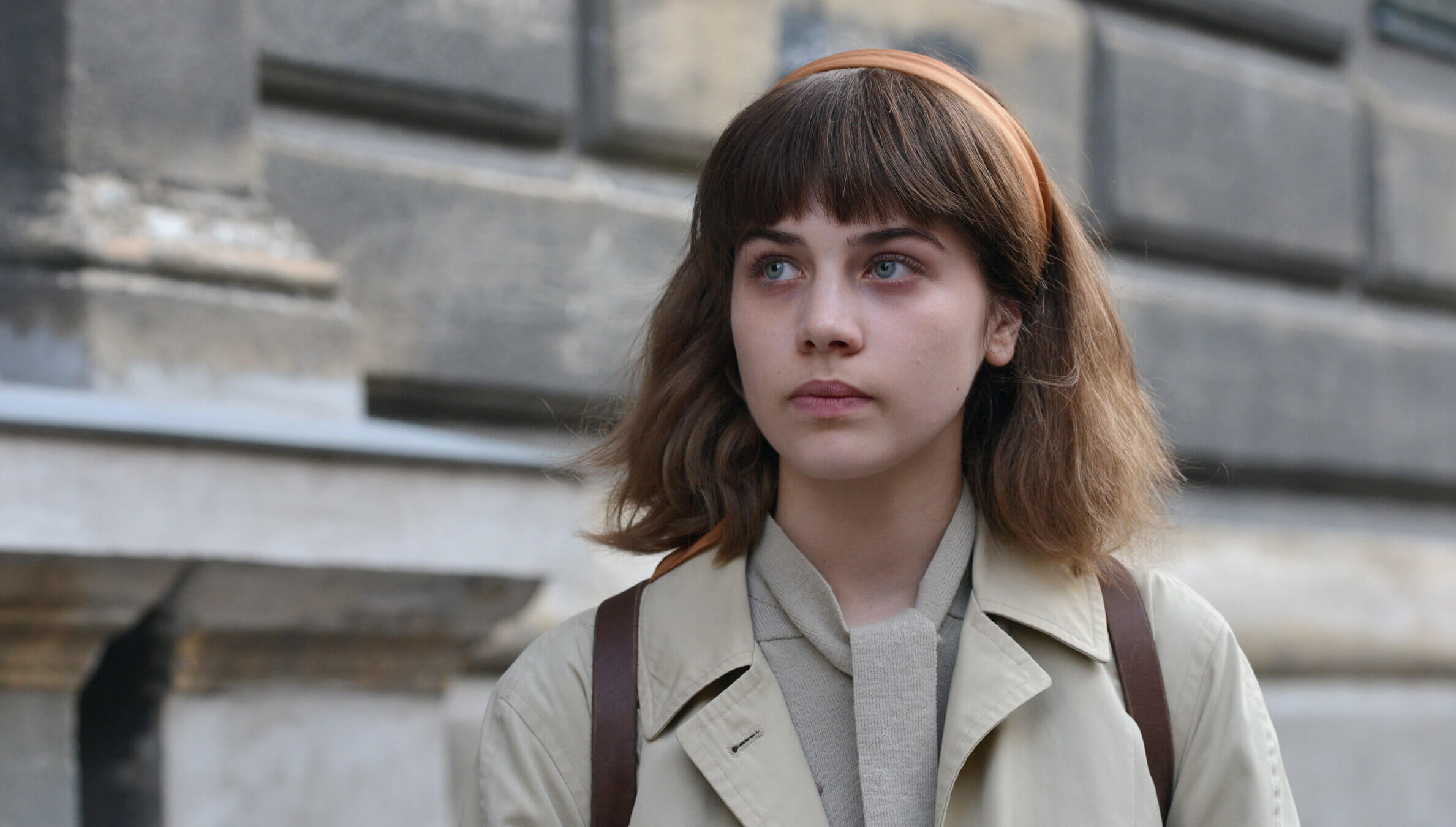In a heart-wrenching film about life after the Holocaust, the makings of a taboo relationship
Set in Budapest, ‘Those Who Remained’ focuses on the friendship between a middle-aged man and a teenage girl

Abigél Szőke stars in Those Who Remained, set in postwar Budapest. Courtesy of Menemsha Films
Those Who Remained depicts an achingly complex love story that embodies a father-daughter relationship and a deep and bonding friendship between two lost souls whose suppressed and silent interactions resonate powerfully.
Brilliantly directed by Barnabás Tóth and based on the 2004 novel by Zsuzsa F. Várkonyi, the muted story is set in a bleak post-Holocaust Budapest as Communism encroaches and Stalin gains ascendancy. It centers on two Holocaust survivors who, for reasons that are not explained, never left or perhaps returned to their native Hungary, a country that betrayed and abandoned them.
Dr. Aládar “Aldó” Kőrner (Károly Hajduk), 42, is once again a practicing hospital gynecologist. A man of few words, he lives alone. His wife and two small sons perished in an unnamed concentration camp.
His life takes an unexpected turn when Klára (Abigél Szőke), 16, is brought to him by her great-aunt and guardian Ogi (Mari Nagy) because her niece is not menstruating yet and she is concerned. Klára has in fact had her first period, but has concealed it from her aunt.
Openly telling lies or, more usually, lying through omission, is a reiterated theme and later becomes a tool of flirtation and a private code between the doctor and the young girl as their relationship evolves. Skeptical of his silences and non-committal responses to her persistent, intrusive questioning, she often asks if he’s lying.
“Always,” he slyly responds.
From the outset, she senses a kindred spirit in the doctor. Shortly after meeting him in the examining room, she barges into his home looking for companionship and escape. She is dissatisfied with everything in her life, not least residing with her aunt.
Outspoken, provocative and aggressive, she has managed to alienate her classmates, teachers and especially Ogi, who is more than happy to share custodial responsibilities for Klára. Aldó reluctantly takes on the role of a surrogate father.

Klára is a complicated ward, unrestrained and spontaneous, yet also boasting a mature intelligence. She’s read and understood Thomas Mann in German, its original language. At the same time, she lives in a netherworld of nightmares, flashbacks and denial, refusing to accept that her parents were killed in the war. She continues to write them letters though they’re never mailed; instead, she stores them in a secret box.
Her torment is close to the surface and when Aldó gently touches her on the shoulder as a gesture of compassion, she throws her arms around him, the warmth, closeness and physical contact tremendously reassuring to both.
Mutual need and tenderness is a constant. In one scene, he’s covering her with a blanket after she’s fallen asleep in his bed. In another, he reveals the gaping wound in his life. Gone from his apartment, he leaves her several photo albums, featuring shots of his family. He asks that she put the albums back in the closet before he returns and not discuss them further. She slowly sorts through the grainy pictures of an attractive woman and her two young sons. Everyone is smiling. Klára bursts into tears overcome with grief on his behalf, theirs and her own.
Later, she asks if he’s religious and he answers “not anymore.”
“Are you angry at Him?” she asks, suggesting that she remains a believer at least on some level. Aldó changes the subject.
Theirs is a forbidden relationship because of the age discrepancy. To outsiders it appears lewd, immoral and unnatural. She is a child-woman, flat-chested and just barely nubile. Low-keyed eroticism is pervasive. When she gets sick, he calls a pediatrician, but turns away as she removes her nightgown to be examined.
For her, the relationship is equally contradictory. Watching Aldó shave, she has flashbacks of her father shaving. Dressing for a dance with kids her own age, she defiantly challenges Aldó like a rebellious daughter by deliberating applying far too much bright red lipstick at the very moment she is sexually teasing him with her reddened mouth.
He demands that she remove the lipstick and she refuses until she is outside and he can no longer see her. There, she rubs off the offending red smudge. She has no interest in arousing boys her own age. Aldó is something else. The line between protective dad and jealous lover is negligible for both.
When the stern and unforgiving headmistress at Klára school spies the couple on a park bench, Klára’s head lying on Aldó’s lap, she is appalled. She views Aldó as a child molester and Ogi accuses Klára of being a whore.
The outside world is closing in on them on more than one front. References to the Stalinist period and those who have unceremoniously vanished crop up in conversations and newspaper accounts. Former friends are now “comrades” even as they double-cross each other. A colleague of Aldó, and also a foster parent to two survivors, admits he has joined the party and has been asked to inform on Aldó.
It’s become a place where overpowering shame and the primal need to survive coexist, making Aldó and Klára’s bond that much stronger. It’s them vs. everyone else. She irons his shirts, suggesting he needs a wife.
Ominously close to crossing a treacherous line, Aldó abruptly courts an age-appropriate woman (Katalin Simkó) he does not love, but wishes he did and the feelings are mutual. She lost her fiancé in the war and hasn’t recovered. There are no villains, no winners.
Throughout the film, there are some wonderful poignant details. Aldó at a restaurant with his new friend ordering pastries for her, unconsciously, almost instinctively choosing Klára’s favorites.
Toth has seamlessly interwoven history with existential themes and personal drama, casting the perfect actors to make viewers care about characters in a deceptively simple story. In her first starring role, Szőke is remarkable, marrying wide-eyed innocence with vulnerability and calculation. Hajduk also knocks it out of the park with his heart-wrenching restraint.
The ending is ambiguous and open to interpretation. The two heroes are reunited three years later at a birthday party for Ogi. Memories are evoked. Perhaps, there’s some regret. But they are moving forward with their lives. For me, the end is devoid of resolution, just pervasive sadness and loss even as life marches on.
















